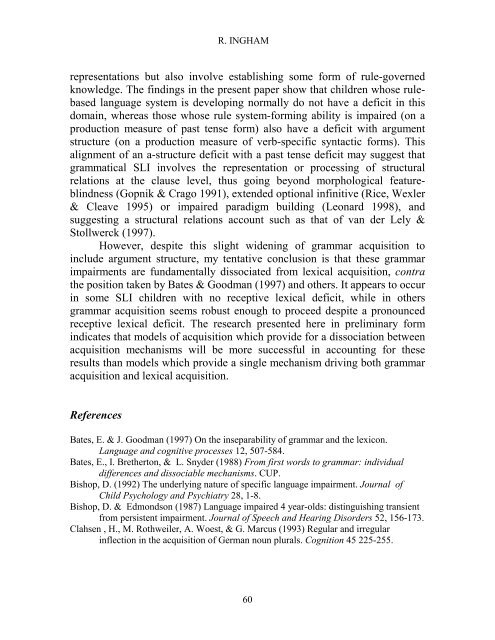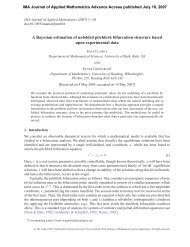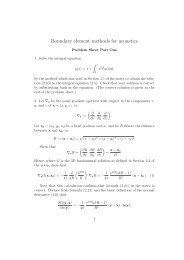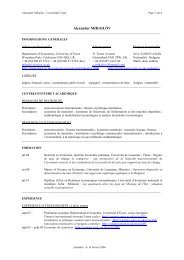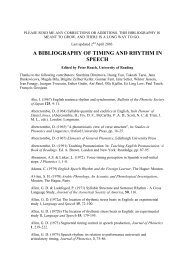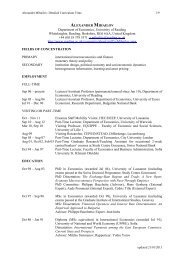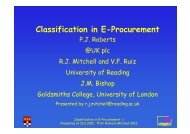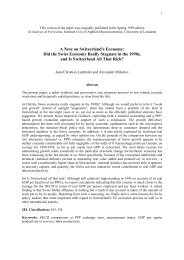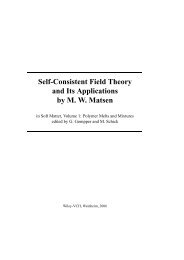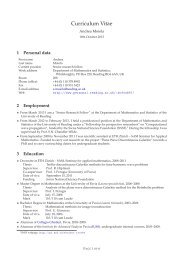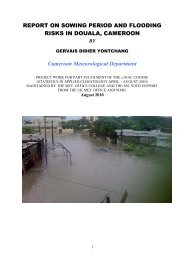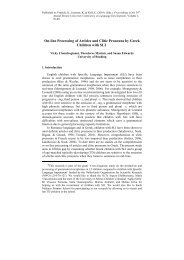Reading Working Papers in Linguistics 4 (2000) - The University of ...
Reading Working Papers in Linguistics 4 (2000) - The University of ...
Reading Working Papers in Linguistics 4 (2000) - The University of ...
You also want an ePaper? Increase the reach of your titles
YUMPU automatically turns print PDFs into web optimized ePapers that Google loves.
R. INGHAM<br />
representations but also <strong>in</strong>volve establish<strong>in</strong>g some form <strong>of</strong> rule-governed<br />
knowledge. <strong>The</strong> f<strong>in</strong>d<strong>in</strong>gs <strong>in</strong> the present paper show that children whose rulebased<br />
language system is develop<strong>in</strong>g normally do not have a deficit <strong>in</strong> this<br />
doma<strong>in</strong>, whereas those whose rule system-form<strong>in</strong>g ability is impaired (on a<br />
production measure <strong>of</strong> past tense form) also have a deficit with argument<br />
structure (on a production measure <strong>of</strong> verb-specific syntactic forms). This<br />
alignment <strong>of</strong> an a-structure deficit with a past tense deficit may suggest that<br />
grammatical SLI <strong>in</strong>volves the representation or process<strong>in</strong>g <strong>of</strong> structural<br />
relations at the clause level, thus go<strong>in</strong>g beyond morphological featurebl<strong>in</strong>dness<br />
(Gopnik & Crago 1991), extended optional <strong>in</strong>f<strong>in</strong>itive (Rice, Wexler<br />
& Cleave 1995) or impaired paradigm build<strong>in</strong>g (Leonard 1998), and<br />
suggest<strong>in</strong>g a structural relations account such as that <strong>of</strong> van der Lely &<br />
Stollwerck (1997).<br />
However, despite this slight widen<strong>in</strong>g <strong>of</strong> grammar acquisition to<br />
<strong>in</strong>clude argument structure, my tentative conclusion is that these grammar<br />
impairments are fundamentally dissociated from lexical acquisition, contra<br />
the position taken by Bates & Goodman (1997) and others. It appears to occur<br />
<strong>in</strong> some SLI children with no receptive lexical deficit, while <strong>in</strong> others<br />
grammar acquisition seems robust enough to proceed despite a pronounced<br />
receptive lexical deficit. <strong>The</strong> research presented here <strong>in</strong> prelim<strong>in</strong>ary form<br />
<strong>in</strong>dicates that models <strong>of</strong> acquisition which provide for a dissociation between<br />
acquisition mechanisms will be more successful <strong>in</strong> account<strong>in</strong>g for these<br />
results than models which provide a s<strong>in</strong>gle mechanism driv<strong>in</strong>g both grammar<br />
acquisition and lexical acquisition.<br />
References<br />
Bates, E. & J. Goodman (1997) On the <strong>in</strong>separability <strong>of</strong> grammar and the lexicon.<br />
Language and cognitive processes 12, 507-584.<br />
Bates, E., I. Bretherton, & L. Snyder (1988) From first words to grammar: <strong>in</strong>dividual<br />
differences and dissociable mechanisms. CUP.<br />
Bishop, D. (1992) <strong>The</strong> underly<strong>in</strong>g nature <strong>of</strong> specific language impairment. Journal <strong>of</strong><br />
Child Psychology and Psychiatry 28, 1-8.<br />
Bishop, D. & Edmondson (1987) Language impaired 4 year-olds: dist<strong>in</strong>guish<strong>in</strong>g transient<br />
from persistent impairment. Journal <strong>of</strong> Speech and Hear<strong>in</strong>g Disorders 52, 156-173.<br />
Clahsen , H., M. Rothweiler, A. Woest, & G. Marcus (1993) Regular and irregular<br />
<strong>in</strong>flection <strong>in</strong> the acquisition <strong>of</strong> German noun plurals. Cognition 45 225-255.<br />
60


